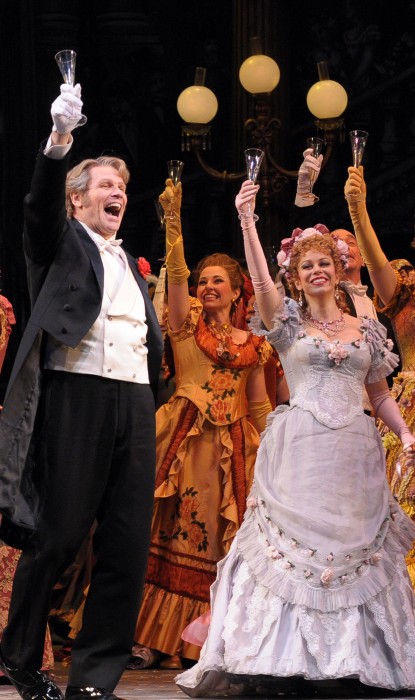Lyric Opera’s delightful “Fledermaus” banishes the winter chill

The Lyric Opera season to date has been characterized by uneven casting and variable conducting and stage direction. Fortunately, the company finally managed to hit one out of the park Tuesday night with its delightful and hugely entertaining production of Die Fledermaus.
As popular and beloved as Johann Strauss Jr.’s melodious 1874 operetta is, Fledermaus remains a difficult work to pull off. While the music is not difficult, finding opera singers that can convincingly handle the operetta style is not always as easy as it might seem. More crucially, the comedy in this tale of upper-class Viennese country matters rarely comes off effectively.
Lyric Opera got all the important things right this time, fielding a terrific cast that showed ease with the vocalism as well as the comedy. Add a colorful production and deft stage direction, and this warm and witty Fledermaus offers a fine way to banish Chicago’s winter chill.
San Francisco Opera’s traditional production looks great on the Lyric stage with Thierry Bodquet’s colorful costumes nicely setting off Wolfram Skalicki’s elegant scenic design. These performances are presented in the original German, avoiding the current dispiriting trend toward low-brow American-English translations. There are some musical trims and Strauss additions, yet Lyric’s Fledermaus, while traditional, is free enough to provide some witty modern topspin on the action.
Bo Skovhus, a worthy Beckmesser in Lyric’s Meistersinger last season, does a deft 180 here as the philandering, hormonally abundant protagonist Eisenstein. Skovhus at times overdoes the silly-ass routine, yet the Danish baritone sang with a robust tone and his kinetic comic presence drove the narrative as the unwitting object of Dr. Falke’s revenge.
Juliane Banse is better known stateside for her concert work and lieder singing, and Tuesday marked her belated American opera debut (as well as role debut) as Eisenstein’s clever wife, Rosalinde.
The German soprano’s voice sounded fitfully dry at times and her rendition of Rosalinde’s Czardas was wanting in agility and brilliance (Banse passed on the final top note altogether). Still, she made an attractive and dignified foil to Skovhus’s hyperactive Eisenstein and entered fully into the comedy, dancing and high-jinks.
Daniela Fally made an outstanding American debut Tuesday night as Adele, the Eisenstein’s resourceful maid. Her voice is on the light side and Fally’s coloratura in Mein Herr Marquis sounded cautious opening night, though she sang with greater confidence in her Act 3 aria. But the petite Austrian soprano is a charismatic, scene-stealing presence on stage, consistently alive to the comedy and plot twists, even doing a floor split twice.
As Prince Orlovsky, former Ryan Center member Emily Fons added another trousers role to her growing repertorial wardrobe. Unsmiling and convincingly androgynous, the mezzo sang with warm tone and etched a superb characterization of the wealthy and eternally bored young Russian royal.
In another noteworthy company debut, Michael Spyres was inspired in the role of Alfred. The American tenor sang with a vibrant echt-Viennese tone with easy high notes and proved comically adept as Rosalinde’s persistent admirer.
Adrian Eröd was an aptly oily presence as Dr. Falke, the title “bat” who plans the party’s masquerade ruse to get back at his friend Eisenstein. The Austrian baritone displayed a light flexible voice in a lovely rendering of the Bruderlein ensemble as well as impressive agility, doing a neat headstand in Act 1.
Current Ryan Opera Center members made worthy comprimarios with Will Liverman booming out the guest announcements as Ivan, and Julie Anne Miller making a lively co-conspirator as Adele’s sister Ida.
The jail scene in Act 3 often falls flat with its long stretches of dialogue and musty humor. Lyric’s staging managed to keep the momentum going, aided by some genuinely funny topical additions—references ranged from the beleaguered mayor of Toronto to Andrew Davis’s auditions– and a trio of supporting artists with superb comedic skills. As in the party scene, Andrew Shore was a hoot as Frank, the blustery warden. The inimitable David Cangelosi made much out of Eisenstein’s shyster attorney, Dr. Blind. And as the bibulous jailer Frosch, Fred A. Wellisch was consistently amusing without overdoing the shtick.
The Lyric Opera Chorus gets a lot of stage time in the long party scene and chorus master Michael Black ensured that the singers characterized individually as well as singing with gleam and precision. Daniel Pelzig’s choreography was lively and imaginative, fluently integrating the principals with the spirited professional dancers.
E. Loren Meeker’s stage direction gracefully navigated the usual pitfalls, energetically putting across the farce without descending to broad and vulgar slapstick. Most importantly, all the principals appeared to be enjoying themselves immensely— gamely entering into the dancing and conveying an infectious sense of robust good humor.
Minor quibbles were that the English surtitles were out of synch with the stage action, running a line or two ahead of the dialogue and too often preempting punchlines before they were delivered.
Also, it would have been great if the company engaged a more experienced conductor steeped in the operetta tradition. Ward Stare, Lyric’s favored house journeyman, brought big swooping gestures and respectable dynamism to the score. Yet while the orchestra played with characteristic commitment and panache, the kind of idiomatic gleam and Viennese lilt the score really requires was largely missing in action under Stare’s direction.
Die Fledermaus runs through January 18, 2014. lyricopera.org; 312-332-2244.
Posted in Performances

